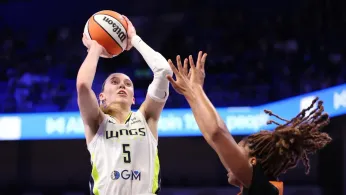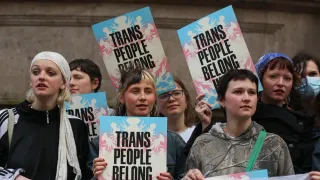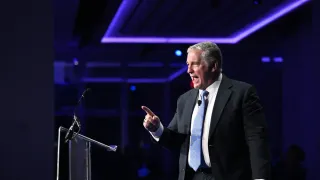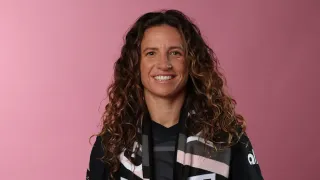
Oct 31
Paige Bueckers Takes Center Court—And Center Stage—in "Jess & Pearl"
READ TIME: 3 MIN.
Paige Bueckers has been a headline-maker since her high school days, shattering records and paving her way from Minnesota’s gyms to UConn’s storied courts, and now, the Dallas Wings in the WNBA. This October, she’s breaking new ground—and not just for herself, but for every queer kid who’s ever looked for themselves in the spotlight. Bueckers is set to headline"Jess & Pearl," Apple Original Films’ latest drama tracking two basketball friends whose bond sours into rivalry, both on and off the court.
But this isn’t just another sports flick. It’s a story about friendship, ambition, and identity—elements that resonate deeply within LGBTQ+ communities, especially those who’ve found family and friction in competitive spaces. And with Bueckers herself acting as executive producer, the film promises authenticity, nuance, and a fresh, player-driven perspective on women’s sports.
Let’s be real: the friends-to-rivals trope hits different for queer audiences. Whether on the court, in the club, or across a dating app, stories of intense connection—and the heartbreak when closeness turns competitive—are the bread and butter of queer coming-of-age."Jess & Pearl" doesn’t market itself as a queer romance, but the emotional stakes, the bonds of chosen family, and the tension of rivalry all echo queer storytelling traditions.
It’s also about visibility. Women’s basketball is a space that’s long been coded as queer-positive, with players and fans alike drawing strength from a culture that celebrates difference and defies stereotypes. Bueckers stepping into a starring role—while also calling shots behind the scenes—signals a new era where athletes can shape their own narratives, hopefully making room for more LGBTQ+ stories in mainstream sports media.
Bueckers is no stranger to breaking barriers. She grew up in Edina, Minnesota, and became the Metro Player of the Year three times running before leading UConn to four Final Fours and a national championship. Her athletic prowess is legendary, but her willingness to venture into film—joining a lineage that includes Lisa Leslie, Renee Montgomery, and, most recently, Angel Reese—expands what it means to be a woman athlete today.
For queer fans, the message is clear: you don’t have to fit the mold. Whether on the court or in the director’s chair, there’s room to rewrite the playbook—and to champion stories that reflect the messiness, joy, heartbreak, and triumphs of real life.
The film’s genesis is promising, too:"Jess & Pearl" was conceived by Zahir McGhee, acclaimed writer for"Scandal," a show celebrated for its layered, intersectional characters and willingness to tackle taboo subjects. McGhee’s involvement hints at a story with depth, edge, and a refusal to play it safe—a quality that’s vital for queer narratives, which so often get flattened or sanitized for mainstream audiences.
Bueckers’ dual role as star and executive producer also matters. It’s rare for athletes, especially women, to have creative control over their own stories. Her presence behind the camera is a signal boost for young LGBTQ+ people dreaming not just of being seen, but of making their own art.
Let’s not forget the wider cultural moment. Women's basketball is having a pop-culture resurgence, with stars like Angel Reese popping up in Netflix cameos and former WNBA icons like Lisa Leslie making memorable turns on TV. Each appearance chips away at the old guard, making space for new stories—and, crucially, new identities.
For LGBTQ+ audiences, that means more than just seeing yourself on screen. It means seeing yourself as complicated, ambitious, and worthy of the spotlight."Jess & Pearl" has the potential to become a touchstone for sports fans, film buffs, and anyone who’s ever felt the sting—or thrill—of rivalry with someone they love.
Even if"Jess & Pearl" doesn’t explicitly center queer romance, its themes—friendship, rivalry, identity, and the search for belonging—are at the heart of so many LGBTQ+ journeys. With Paige Bueckers at the helm, the film stands to challenge stereotypes, uplift women’s sports, and forge new paths for queer visibility in Hollywood.
And as Bueckers herself moves from MVP to movie star, she’s bringing the whole community with her—showing that whether you’re on the court or in the director’s chair, you belong.






